
Teaching Excellence Awards
Teaching Excellence Awards recognise individual excellence, commitment to continuing professional development, commitment to students and colleagues, and sustained and continued impact.
Teaching Excellence Awards are presented annually to an employee in Higher Education. In 2022, this award was expanded to accept nominations in two categories: ‘Early Career’ and ‘Established Educator’.
- The 'Early Career' category is open to nominees typically within 10 years of receiving their highest qualification.
- 'Established Educator' is open to any nominee that has received their highest qualification more than 10 years ago, so is likely to categorise themselves as mid or senior career.
Please note that career breaks are taken into consideration for the Teaching Excellence Awards. If you have any queries regarding the eligibility criteria for an award, please contact the Awards Team.
Nominations will first be considered by the Training Theme Panel and Education, Training and Public Engagement Committee and the final decision will be ratified by the Awards Committee.
Announcing our 2026 Award winners
Congratulations to Dr Rebecca Lewis (University of East Anglia) and Dr Sophie Rutschmann (Imperial College London)!
Find out more about our latest winners below
The recipient is given:
- £2,000 prize money
- A trophy
- The opportunity to present a lecture at a Society event or webinar with an educational or training focus
- An invitation to submit an article to one of our journals, with any fees waived
Eligibility criteria:
- Awarded annually
- Nominees should be employed in Higher Education and should demonstrate some or all of the following criteria:
- Individual excellence – develops and employs innovative and effective approaches to teaching and assessment in the molecular biosciences which successfully promote student learning and achievement
- Commitment to own continuing professional development – Undertakes professional development activities that actively influence and enhance the teaching and learning of molecular biosciences
- Commitment to students and colleagues – Inspires students and colleagues to excel; shows awareness of the different needs of students; provides evidence of supporting teaching and learning beyond their own department and Institution; supports and guides students’ career choices and goals; champions the importance of excellence in molecular biosciences teaching
- Sustained and continued impact – contributes at a high level over a sustained period of time (not for a single activity), demonstrates impact nationally and/or internationally, commits to build, support, and nurture future talent
- Nominations are welcomed for 2 categories: ‘Early Career’ and ‘Established Educator’
- Nominees can be either international or UK based
- This award is only open to individuals
The Awards Committee will consider the following aspects of all nominations for the Teaching Excellence Awards as appropriate:
- Individual excellence
- Commitment to own continuing professional development
- Commitment to students and colleagues
- Sustained and continued impact
- Other indicators of esteem demonstrated by the nominator

Previous Award Lecture
Emma Yhnell presented her Award Lecture 'Why I treat every lecture like a performance: the privilege of being able to inspire in every teaching session' as part of the Biochemistry Focus webinar series.
View the recordingContact us
For further information please get in touch with the Awards department.
Related content
5 itemsRecipients
Rebecca Lewis
Early Career
Rebecca Lewis

The Early Career Teaching Excellence Award will be presented to Dr Becky Lewis. Although teaching throughout her PhD, Becky’s lecturing career really began in 2019, where she became course director for biological sciences with a foundation year and biochemistry with a foundation year, organising the biology modules for these courses. Her current role includes responsibility for skills development in first year students across the school of biological sciences, through organisation of the Professional Skills for Biosciences module. Becky has adapted this module, improving the authenticity of the assessment and the student experience. As an advocate for staff sharing best practice in student skills development, Becky has established a Skills Community of Practice. Becky has also adopted the role of Transitions officer, and as part of this has collaborated with colleagues to produce a pre-arrival module for their students. They were awarded the European First Year Experience Team Award for this work, which they have shared openly with other schools and institutes through various talks, publications and their annual Student Belonging Conference. Becky is also the 2024 winner of her institutional Sir Geoffrey and Lady Allen Prize for Excellence in Teaching. Across her teaching, Becky strives to implement new ways to engage her students and enhance their transferable skills, through unconventional teaching methods, such as campus-wide trails and teamwork projects, or innovations in assessment, such as through student conferences and vivas.
Rebecca said: “I am so pleased to have won this Teaching Excellence Award from the Biochemical Society. The opportunity to share what I’ve been working on and receive such validation is greatly appreciated and very motivating and I’m honoured to be contributing to advancements in learning and teaching in the biosciences. I’m very grateful to those that nominated me or supported my application and to the Biochemical Society: thank you!”
Sophie Rutschmann
Established Educator
Sophie Rutschmann
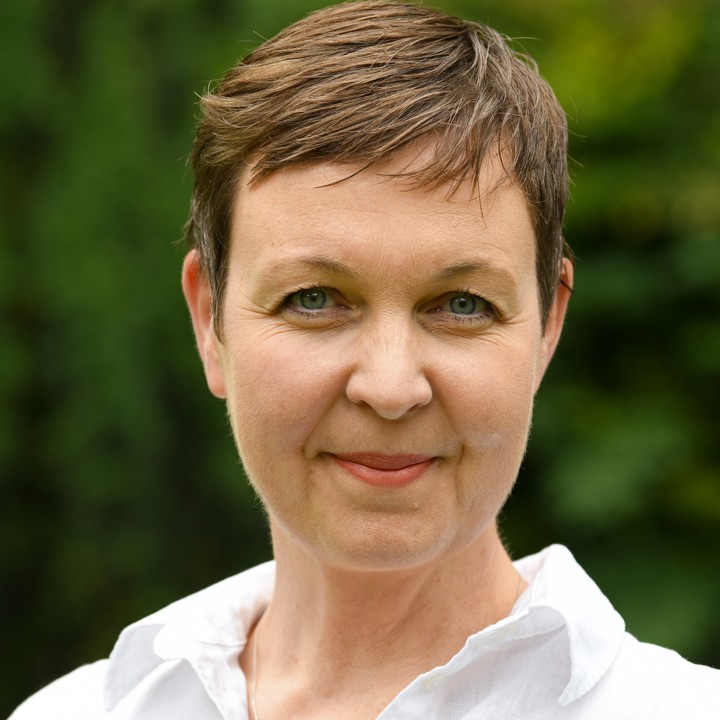
The Established Educator Teaching Excellence Award will be presented to Dr Sophie Rutschmann. Sophie is a dedicated immunologist who, after an impactful career in STEM research, decided to focus on education at Imperial College London.
Sophie uses her dual expertise in research and education to continuously innovate and passionately advocate imbedding authentic aspects of the scientific community in the classroom to develop students’ knowledge and critical thinking skills. In particular, she has implemented a student-centred taught laboratory module in which students design, execute, analyse, and troubleshoot their own mini-research project, has designed a module during which students teams attend a national Immunology conference to investigate a topic and report their findings, and developed a very successful immunology suite of open content courses available for free to thousands of learners worldwide. The evidenced positive impact of several of Sophie’s approaches on students’ learning and teachers’ enjoyment has encouraged others to adapt and implement them in their taught programmes at Imperial and beyond.
Over the years, Sophie’s education and leadership impact, reach and value have been recognised by many colleagues, students, and institutional accolades. Most recently, she received the British Society for Immunology's first Teaching Excellence Award and was awarded a National Teaching Fellowship of the Higher Education Academy.
Sophie said: "I am extremely honoured to have been awarded the Established Educator Teaching Excellence Award by the Biochemical Society. The recognition of my work’s quality and impact by educators in my STEM field validates my approaches, boosts my confidence, and give me renewed energy to continue my endeavours! This award also recognises the support I have received from past and present colleagues, the opportunity I had to interact with exceptional students, and the work we all do in training the next generation of scientists.”
Nicholas Weise
Early Career
Nicholas Weise
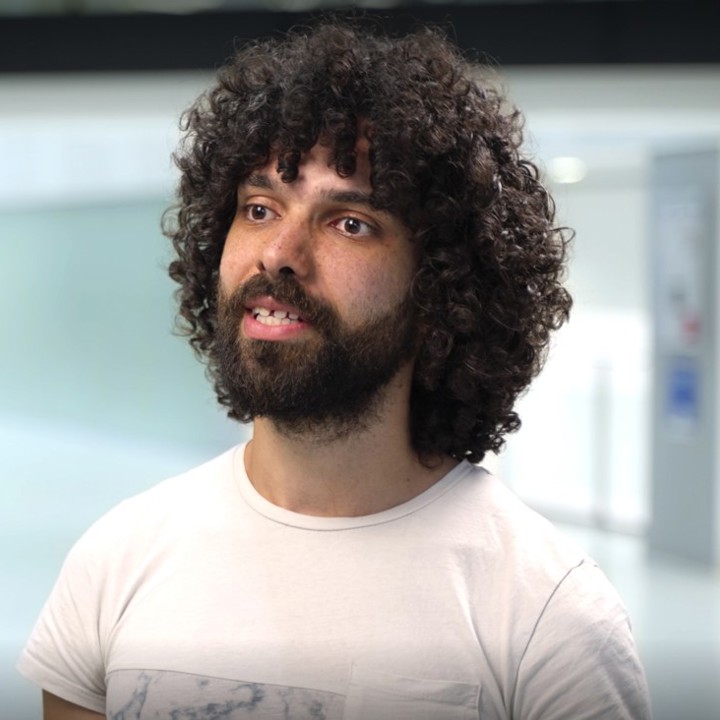
The Teaching Excellence Award - Early Career will be presented to Dr Nicholas Weise in 2025. Nick’s development as a teacher began as a Peer-assisted Study Session (PASS) Leader mentoring 1st year students alongside his study for a BSc in Molecular Biology. He then became a Graduate Teaching Assistant and outreach volunteer whilst pursuing a PhD in Chemistry and Applied Enzymology. Upon completion of his studies he worked as a Public Engagement Programme Manager for the Manchester Institute of Biotechnology before securing a position as a Lecturer at the University of Manchester. He currently holds two Senior Lectureships, one at the Manchester Medical School and the other in the Department of Chemistry, where he also leads the peer support, employability and learning enhancement portfolios. In 2020 he became an Inaugural Fellow of the Institute of Teaching & Learning, a co-founding member of the UK National Learning & Teaching Focused Network in 2022 and in 2023 a Principal Fellow of the Higher Education Academy (Advance HE). A keen disseminator of both biochemical and educational principles, Nick has organised and participated in over 90 outreach visits with non-traditional audiences and trained a variety of academic and NHS professionals nationally in pedagogic practice and instructional systems design.
Nick said: “It is an honour to have received this award from the Biochemical Society. I would like to thank all of my collaborative colleagues, mentors and student co-creators for working with me on a variety of initiatives! As an academic on an education track, it is easy to feel that your work is valued less, particularly when a lot of the emphasis for reward and progression at universities is on publication record and grant income. So this recognition really means a lot and has motivated me to keep doing what I am doing. I will also feel more emboldened when encouraging others to do the same and work for the benefit of their learners and those who teach or support them.”
Read Nick's article published in the Biochemist - A team approach to teaching molecular biosciences: involving, recognising and rewarding others
David Tree
Established Educator
David Tree

The Teaching Excellence Award - Established Educator will be presented to Dr David Tree in 2025. David brings a wealth of experience and expertise to the field of the education of the molecular biosciences. With a background in genetics from the University of Cambridge and post-doctoral research from Stanford University, he has taught genetics to Biomedical Sciences BSc students since 2005. His dedication to excellence in teaching is evident in his commitment to pedagogical innovation, such as pioneering the creation of the Life Sciences BSc at Brunel University in 2017. This program allows students to create unique interdisciplinary learning experiences integrating subjects across the life and computational sciences, offering students a distinctive educational experience. David champions pedagogical innovations and promotes novel teaching and assessment methodologies through active learning pedagogies like Team-Based Learning (TBL) and authentic, synoptic assessments strategies, like Integrated Program Assessment (IPA). Beyond his contributions to curriculum design, David is a strong advocate for inclusive education. He has led initiatives to address cultural representation in science, belonging anxiety and awarding gaps, fostering a more equitable learning environment. Through his dedication to excellence in education and commitment to improving student outcomes, David has transformed teaching and assessment culture at Brunel University and beyond.
David said: "I'm delighted to receive the Biochemical Society's Teaching Excellence Award, which highlights the significance of innovative teaching and assessment practices such as integrated and synoptic assessments and active learning pedagogies. This recognition reaffirms the value of fostering inclusive and supportive learning environments, where students are empowered to engage actively and integrate knowledge across disciplines. I am grateful for the opportunity to contribute to the advancement of life sciences education and to inspire future generations of scientists."
Read David's article in the Biochemist - From silos to synthesis: ensuring interdisciplinary education through synoptic assessment
Emma Yhnell
Early Career
The 2024 Teaching Excellence Award - Early Career will be presented to Dr Emma Yhnell. Emma is a passionate and multi award-winning educator, science communicator and Senior Lecturer based at Cardiff University. Emma obtained a BSc degree in Biochemistry before completing a PhD in Huntington’s disease. She then began an independent research fellowship funded by the Welsh Government through Health and Care Research Wales to translate her findings on cognitive training into the patient clinic. Emma’s clinical research inspired her and demonstrated the need to provide accessible and engaging information. Working currently as a teaching and scholarship focused Senior Lecturer, Emma now teaches the next generation of budding scientists. Using her international expertise in science communication, she delivers engaging and interactive teaching sessions with passion and infectious enthusiasm. Emma is a well-respected academic who has built a reputation for her ability to untangle the academically technical and translate it into entertaining, relevant and engaging content. In 2022 she was elected to the Learned Society of Wales as the youngest ever Fellow. As a first generation academic with expertise in equity, diversity and inclusion, Emma is changing the typical image of teaching in Higher Education by making science more open, honest and fun.
On winning the first Teaching Excellence Award - Early Career, Emma said: "Wow, I am absolutely ecstatic and incredibly humbled to win the Biochemical Society’s Teaching Excellence Award - Early Career in 2024! Thank you so much / diolch yn fawr iawn to those who nominated me and supported my application. I want to use this award to encourage others to try out innovations in their own teaching, whether that is incorporating a prop, trying some interactive polling or even playing some music; give it a go, I am sure that your students will massively appreciate it. Pursuing a career in teaching has been the best career decision and it is such a pleasure and a privilege to play a small part in helping our Bioscience students to understand complex topics. I will keep doing my best to make teaching in Higher Education more accessible, inclusive and fun so that all students can reach their full potential.”
Emma presented her Award Lecture 'Why I treat every lecture like a performance: the privilege of being able to inspire in every teaching session' as part of the Biochemistry Focus webinar series. View the recording.
Read Emma's article published in the Biochemist - The future of lectures: ten top tips for engaging and inclusive teaching
Ellie Davison
Established Educator
The 2024 Teaching Excellence Award - Established Educator will be presented to Dr Ellie Davison. Ellie is the Director of Teaching and Learning for the University of Lincoln Science Foundation Year (SFY), providing a year zero for over 40 programmes across the College of Science. Drawing on her collaborative skills, developed during an early career in genetics research, and her pedagogic expertise cultivated during her years as an ‘outstanding’ secondary school science teacher, Ellie leads teaching and learning for over 250 students a year who have faced barriers to learning or have non-traditional qualifications. Ellie ensures that flexibility and inclusive design are built-in as default, with multi-format learning activities, differentiated resources, and an assessment strategy that enables all students to showcase their strengths. She embeds transferable academic and holistic skill development into the curriculum, including maintaining positive mental health, ensuring students thrive in future years of their degree and beyond. Ellie supports colleagues across and beyond the institution to develop their inclusive practice, and devises opportunities for students to develop their own teaching and pedagogic research skills. Ellie led SFY to national recognition with a CATE award for ‘closing well known attainment gaps’ and is recognised by the sector as a National Teaching Fellow (NTF) for ‘spearheading the provision of a transformative education’.
On winning the Teaching Excellence Award - Established Educator in 2024, Ellie said: "I’m thrilled to receive the Biochemical Society Teaching Excellence Award and to be able to champion our magnificent foundation science students who, often against a backdrop of personal challenges or circumstances, enrich our institutions with their determination to succeed."
Read Ellie's article published in the Biochemist - Students’ top-10 wish list for inclusive, engaging video lectures
Barry Ryan
Barry Ryan

The 2023 Teaching Excellence Award was presented to Dr Barry Ryan. Barry is a SFHEA, a CSci Teach and a research active applied biochemist with a proven expertise in practitioner use of, and leadership in, evidenced-based pedagogies in modern higher education. His approach to teaching has always been transformative and is underpinned by his integration of pedagogical research to inform and shape his practice. This approach is embodied by his early adoption, and continued research-led development, of the student as co-creator paradigm. Barry was awarded the Irish National Award for Innovation in Teaching and Learning (2014), the Royal Society of Chemistry Higher Education Award (2019) and an Irish National Teaching and Learning Research Fellowship (2020) in recognition of his development and dissemination of this philosophy. Concurrently, his lab-based research aligns with his educational research, resulting in a multi-faceted research profile incorporating community, laboratory, and pedagogical research to support and nurture biochemists at all levels of higher education.
He seamlessly weaves these research strands together, promoting a student centred, research informed approach to biochemistry education that is both original and innovative. Away from the lab and lecture hall, Barry has led curriculum reimagination in TU Dublin (CoCREATE) and is currently on secondment developing and implementing the TU Dublin Education Model.
Barry said: “I am delighted to receive this prestigious award from the Biochemical Society. It is an honour to be selected for this award and to join the fantastic past awardees as a representative of excellence in biochemical teaching and learning. This award validates my student-centred approach and will inspire me to continue to innovate and share my practice.”
Barry presented his Award Lecture at Evolving Molecular Biosciences Education between 25-26 May 2023 in Manchester.
Read Barry's article published in the Biochemist - Eight steps to facilitating more equitable education in undergraduate sciences.
Dave Lewis
Dave Lewis
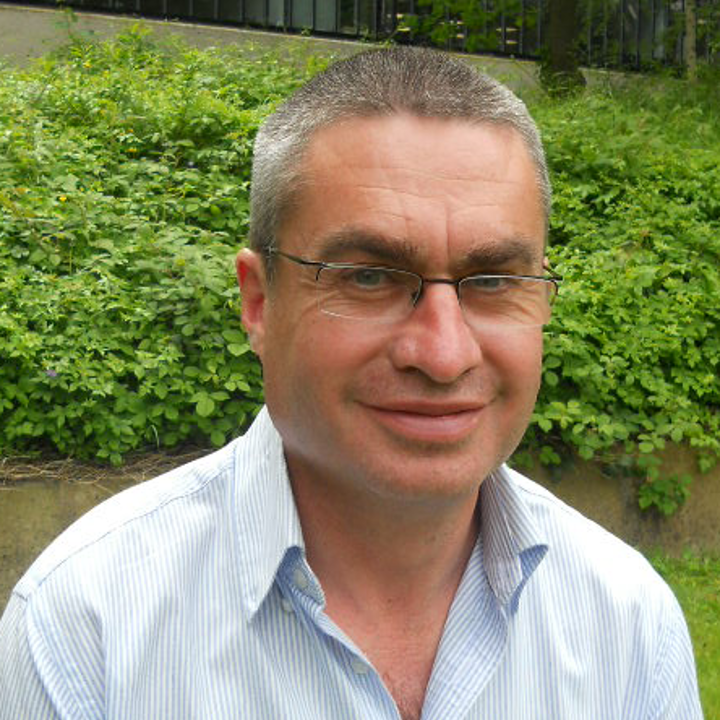
The 2022 Teaching Excellence Award was presented to Dr Dave Lewis. Dr Lewis is a Senior Lecturer in Pharmacology and Bioethics, Faculty of Biological Sciences, University of Leeds. A student-education focused colleague, he is passionate about educational equality and promoting inclusion; providing opportunities within and outside the curriculum for every student to realise their academic and personal goals. Recognising that increasing numbers of his students were not going onto careers in research, Dave introduced the concept of the capstone project, with its focus on personal and professional development, into his programmes as an alternative to traditional research projects. With colleagues, he has co-created a sector leading portfolio of fourteen different project opportunities, a combination of traditional research projects offered alongside scientific or industry-relevant capstones, and those with a civic or societal focus. Dave freely shared his ideas and resources globally to support colleagues struggling to deliver final year undergraduate research projects during the current pandemic. Appointed as Chair of IUPHAR’s IOSP initiative, Dave uses his expertise in research animal sciences to co-create and co-deliver, in partnership with national pharmacological societies, animal welfare organisation and regulatory bodies, professional education courses in research animal sciences, welfare and ethics for those who care for or use animals in research in the Global South.
Dave said: “I’m extremely honoured to receive this prestigious award. It’s been a collaborative team effort – I owe a huge debt of thanks to everybody (students, colleagues, external partners) that have contributed. It’s only the start of the journey, we need to build on what we have started, encourage others from across HE to come on-board, working collaboratively together to fully realise the transformative potential of student capstone projects."
Dave presented his Award Lecture as part of our Biochemistry Focus webinar series. View the recording.
Rosemary Clyne
Rosemary Clyne

The 2021 Teaching Excellence Award was presented to Dr Rosemary Clyne at Queen Mary University of London, UK. Rosemary earned her PhD at the Johns Hopkins University School of Medicine working with Professor Thomas Kelly, and conducted postdoctoral work as a Damon Runyon-Walter Winchell Fellow at the Research Institute of Molecular Pathology in Vienna, with Professor Kim Nasmyth, in the field of chromosome dynamics and cell cycle regulation. She is currently Senior Lecturer at Queen Mary and the university’s Academic Lead for International Student Experience, where she founded the Future Global Leaders Forum student leadership programme. Rosemary is a Senior Fellow of the Higher Education Academy and the recipient of two Queen Mary Education Excellence Awards.
Rosemary presented her award lecture ‘Fostering Laboratory, Enquiry and Cross-Disciplinary Skills: A Digital Journey’ on Wednesday 27 April as part of the Biochemistry Focus Webinar Series.
On winning the Teaching Excellence Award, Rosemary said: “I am absolutely thrilled to receive this distinguished award from the Biochemical Society. For me this Award recognises my inclusive approach toward delivering the best possible learning experience for all students. I have championed the potential of technology to elevate learning and improve confidence toward experimental work. I am grateful to Queen Mary for supporting the digital learning and outreach projects that have enabled me to communicate my enthusiasm and passion for science education so widely. I share this honor with all the fantastic students who have inspired my work.”
Jo Rushworth
Jo Rushworth
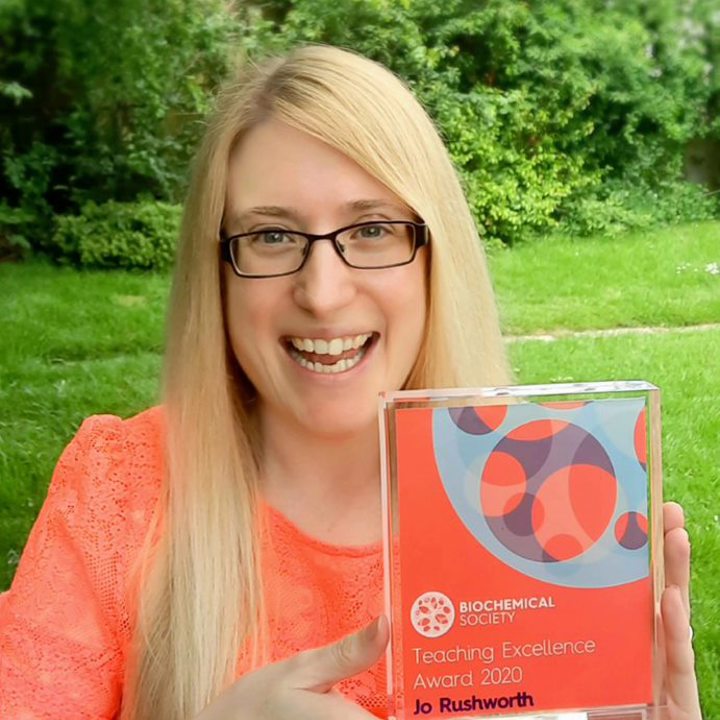
The 2020 Teaching Excellence Award was presented to Dr Jo Rushworth of De Montfort University, UK.
Four years after commencing her first lectureship, Jo was one of the youngest ever recipients of a National Teaching Fellowship in 2018. With 100 nominations for the Vice-Chancellor’s Distinguished Teaching Award, which she won in 2016. Jo has championed De Montfort University’s inclusive teaching and learning strategy, known as Universal Design for Learning. Her approach to teaching provides flexible ways for all students to learn and to demonstrate their knowledge, including songs, video podcasts and chocolate-based analogies for cellular respiration. Jo enjoys encouraging her students to be active learners, using team-based learning, flipped classroom and flipped feedback, voting using Mentimeter and animal noises, summary sheets and drop-in sessions. Jo is particularly interested in developing teaching and learning methods that work for large, diverse groups of students. Jo is a passionate advocate of co-creation and works with her students to create their learning, for instance by appointing a student module leader and a team of student biochemistry lecturers. Jo is a highly reflective lecturer who enjoys trying out new and innovative ideas and loves to inspire other lecturers to do the same. She devised feedback boxes which are now used across her faculty, to help lecturers make the most of everyday feedback from students. Jo applied her novel biochemistry teaching methods to co-create a new Post-Graduate Certificate in Higher Education, which has seen her teaching, assessment and feedback methods be adopted across and beyond her University.
Jo said: “I feel so honoured and humbled to receive the Teaching Excellence Award. I have been a member of the Biochemical Society since I was an undergraduate student and I was always inspired when my lecturers were featured in The Biochemist. Everything I do is for my students and I am just so grateful for their tremendous support and inspiration.”
Jo presented her Award lecture on Thursday 13 May 2021 as part of the Biochemistry Focus webinar series. View the recording.
Luciane Vieira de Mello
Luciane Vieira de Mello
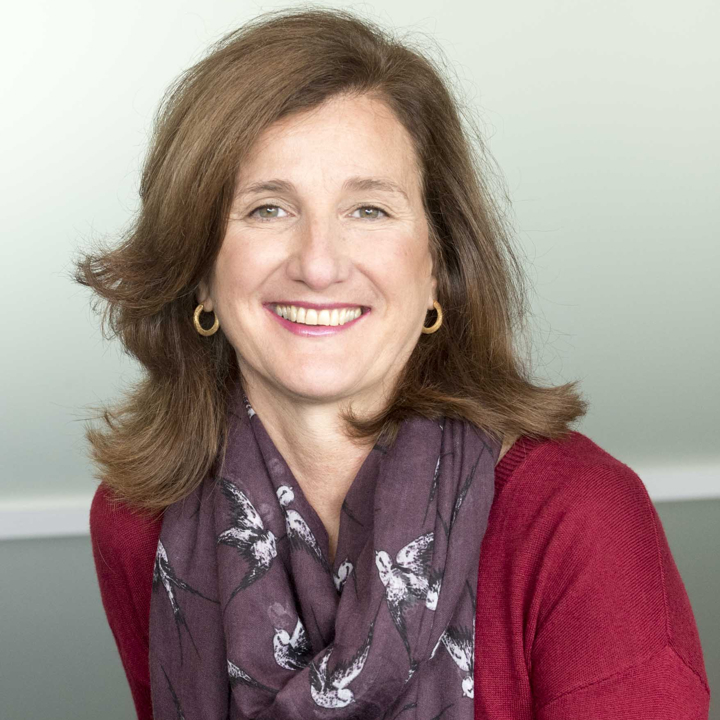
The 2019 Teaching Excellence Award was presented to Luciane Vieira de Mello from the University of Liverpool, UK. Lu has published over 40 research articles in biochemistry and bioinformatics but in 2012 she decided to direct her career towards teaching and learning. Lu’s broad educational research interest focuses on student–staff partnership, internationalisation, and employability. Lu’s contribution has been to devise, test and disseminate a range of novel methods that enable such students to understand and use bioinformatics effectively. Students in science struggle to recognise and reflect on transferable skills gained during their undergraduate and life. Lu designed an online reflective log and a skills audit in a placement module to help students recognise and reflect on the transferable skills gained during their undergraduate degree. The positive impact on student experience has been evaluated, and some of the assessment procedures have since been adopted across the Faculty.
Lu said “I am delighted and honoured to receive the Teaching Excellent Award. I believe it is important to recognise teaching innovations alongside research excellence and applaud the Biochemical Society’s initiative. I am grateful to my colleagues for their support; and to my students for engaging with my teaching innovations. As Paulo Freire said “what the educator does in teaching is to make it possible for the students to become themselves”.
Luciane presented her award lecture at the HUBS Annual Meeting 2019 on 30 April – 1 May 2019 at the Wellcome Genome Campus in Cambridge.
Dee Scadden
Dee Scadden

The inaugural Teaching Excellence Award was awarded in 2018 to Dee Scadden from the University of Cambridge. Following a successful research career that made a significant contribution to understanding the role of ADARs and RNA editing in mammalian cells, Dee has recently focused on developing innovative online teaching tools that aim to support learning within various undergraduate courses in Biochemistry. Use of such resources will increase access, engagement and flexibility for students beyond the conventional classroom, thereby enhancing teaching and learning. They will also provide opportunities for academics to explore new teaching styles to enrich learning.
Of winning the Teaching Excellence Award, Dee said “I am absolutely delighted to receive the Teaching Excellence Award, and am grateful to my colleagues for their support. The opportunity to engage closely with students and to develop teaching resources that support and encourage learning is a real privilege.”
Dee presented her Award lecture at the Society training event ‘Evolving molecular bioscience education’ on 12-13 April 2018 at the University of Chester, UK.
Share this page!
Teaching Excellence Awards
Teaching Excellence Awards are presented in 2 categories: 'Early Career' and 'Established Educator' and recognize individual excellence, commitment to continuing professional development, commitment to students and colleagues, and sustained and continued impact.




